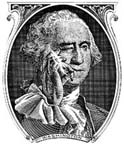2.23.2004
Former President Carter: "Americans generally oblivious to suffering elsewhere in the world."
By David Peterson
February 22, 2004: (Star Tribune) NORTHFIELD, MINN. -- Former President Jimmy Carter delivered a Saturday sermon to a standing-room-only crowd at St. Olaf College, condemning the American people as much as their leaders for what he called their indifference to the disease and despair that prevail in much of the developing world.
"It's a different world from ours," he said. "And we don't really care what happens to them."
The winner of the 2002 Nobel Peace Prize was in Minnesota as the centerpiece of the two-day 16th annual Nobel Peace Prize Forum.
He was greeted with foot-stomping rapture, applauded not only in the college's Skoglund Center gymnasium but again in the lobby by audience members who disobeyed a request and sneaked outside to watch him be escorted to his car.
Carter, who was just back from Africa, joked that Minnesota is similar to Oslo, Norway, in that even the gospel choirs seem to be mostly white. He answered a question about how to deal with the polarization of American politics by playfully asking the college president for permission to be "biased," then saying, "Vote Democratic!" -- an exhortation that drew an enthusiastic response.
What made his talk more sermonlike than political, however, was his depiction of Americans, who he said are as responsible as their government for continuing problems around the world.
He said that "despite glorious speeches in Washington" pledging assistance for AIDS in Africa, the nation of Ghana is actually getting a sixth of what it used to get from this country, and that the United States is giving one-seventeenth as much aid to others in proportion to income as Norway does.
"The problem lies among the people of the U.S.," he said. "It's time to assess what the government is doing, and shape and influence it appropriately."
Although this is a "great country, with great potential," he said, it is not doing what it could to bring about peace, freedom and health in the developing world.
A receptive audience
The Rev. David Preus, former president of the American Lutheran Church (now part of the Evangelical Lutheran Church in America), who was in the audience, agreed afterward that Carter's message was reminiscent of a sermon. Asked whether he agrees with the former president that Americans don't care about the fate of far-off peoples, Preus said, "Most people care, but remotely. These issues aren't on the radar for the major share of Americans, except Iraq. Tax cuts seem to be a mantra."
Carter was elected president in 1976 on a ticket with Minnesota's Walter Mondale, who was beside him on Saturday.
Although Carter is remembered for his emphasis on human rights and peace, he also emphasized, in a question that challenged him on the need to maintain military strength to maintain peace, that he is a veteran. Indeed, among presidents since the Civil War, he said, he ranks second only to Dwight Eisenhower, supreme Allied commander in Europe in World War II, for his number of years of military service.
He agreed with his questioner that military power is vital to promote peace. "It is very important in causing other countries to settle their differences with us peacefully," he said.
Although he was trained to kill, he said, he considers war a last resort, and, in answer to a question, said he does not agree that Iraq needed to be attacked.
"There was no need to go in," he said. United Nations inspectors found no evidence of weapons of mass destruction nor ties to terrorists responsible for the Sept. 11 attacks, he said, so the war was based on "false premises, mistakenly or deliberately."
He said he believes that the Bush administration has squandered the opportunity offered by the global outpouring of goodwill after Sept. 11, and it now needs to exit Iraq with as much dignity as it can manage, while remaining responsible for the security of that nation's people.
The last question put to him in Northfield was whether he'd be willing to run for president this year.
"No thank you," he said. "I'd rather be here with you."
David Peterson is atdapeterson@startribune.com.
Copyright 2004 Star Tribune. All rights reserved.
